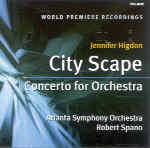Jennifer Higdon’s chamber works have received a good bit of attention on disc–wissahickon poeTrees (on Albany) is especially worth hearing. Her orchestral piece Blue Cathedral is featured on another recent four-composer Telarc collection from these forces called Rainbow Body (the title work not by Higdon), but even in the company of such familiar additional names as Barber and Copland, Higdon’s work stands out for its vibrant colors, accessibility, and craftsmanship. All of these qualities are on display in this magnificent new production devoted to a couple of her large-orchestra works, and judging from the results she’s one of the best American composers on the scene today.
The Concerto for Orchestra, in five movements echoing Bartók’s seminal work in the form, explores dazzling extreme orchestral virtuosity with amazing confidence and mastery. The opening movement offers an explosion of sonic brilliance from all sections of the orchestra, followed by a delightful strings-only scherzo whose writing at times has something of the ecstatic quality of Michael Tippett. The middle movement offers each group of instruments an opportunity for lyrical display, while the fourth movement belongs primarily to the percussion, first mallets and then unpitched instruments creating the ostinato that carries over into the finale, a brilliantly judged gradual accelerando that closes with a bang.
This bare-bones description hardly does justice to the music’s ear-appeal and structural integrity, for although it plays for about 35 minutes, the time passes with amazing speed. There aren’t any “dead spots” at all, and in this performance under Robert Spano the Atlanta players have what sounds like a blast with the many opportunities the piece offers them. Originally written for the Philadelphia Orchestra, which staged its triumphant premiere in 2002, it’s difficult to imagine the Concerto being better played or recorded than here. Certainly the work should be taken up by orchestras everywhere.
The same qualities that characterize the Concerto also inhabit City Scape, a three-movement tribute to Atlanta, the city of the composer’s birth. Written with every bit as much gusto and flair as the Concerto for Orchestra, this piece has a more obvious melodic basis, particularly in the central movement–river sings a song to trees–an impressively sustained 17-minute meditation that concludes with what sounds like a cross between the first movement of Berg’s Three Pieces for Orchestra and the enchanted garden scene in Ravel’s L’enfant et les sortileges. State of the art sonics once again offer maximum impact while capturing the music’s great lyrical beauty with crystal clarity.
Unquestionably Higdon has it all as a composer: a generous fund of ideas, terrific technique, an excellent sense of musical timing, and enough concern for her audience to write music that can be enjoyed at first hearing but that never panders or sounds derivative. I originally filed the Rainbow Body CD under “B” for “Barber”, but I’m moving it over to “H” as a companion to this remarkable release. How wonderful it is that recording contemporary music these days is becoming a pleasure rather than a penance! Let’s hope my Higdon discography soon has much more company.
































